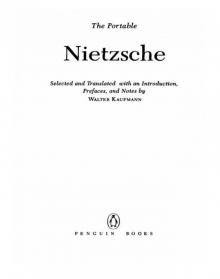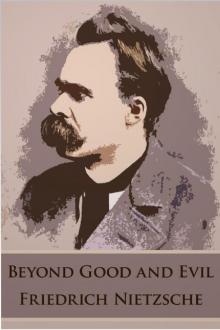- Home
- Friedrich Nietzsche
Aphorisms on Love and Hate Page 3
Aphorisms on Love and Hate Read online
Page 3
Egoism is not evil, for the idea of one’s ‘neighbor’ (the word has a Christian origin and does not reflect the truth) is very weak in us; and we feel toward him almost as free and irresponsible as toward plants and stones. That the other suffers must be learned; and it can never be learned completely.
*
Harmlessness of malice. Malice does not aim at the suffering of the other in and of itself, but rather at our own enjoyment, for example, a feeling of revenge or a strong nervous excitement. Every instance of teasing shows that it gives us pleasure to release our power on the other person and experience an enjoyable feeling of superiority. Is the immoral thing about it, then, to have pleasure on the basis of other people’s unpleasure? Is Schadenfreude devilish, as Schopenhauer says? Now, in nature, we take pleasure in breaking up twigs, loosening stones, fighting with wild animals, in order to gain awareness of our own strength. Is the knowledge, then, that another person is suffering because of us supposed to make immoral the same thing about which we otherwise feel no responsibility? But if one did not have this knowledge, one would not have that pleasure in his own superiority, which can be discovered only in the suffering of the other, in teasing, for example. All joy in oneself is neither good nor bad; where should the determination come from that to have pleasure in oneself one may not cause unpleasure in others? Solely from the point of view of advantage, that is, from consideration of the consequences, of possible unpleasure, when the injured party or the state representing him leads us to expect requital and revenge; this alone can have been the original basis for denying oneself these actions.
Pity does not aim at the pleasure of others any more than malice (as we said above) aims at the pain of others, per se. For in pity at least two (maybe many more) elements of personal pleasure are contained, and it is to that extent self-enjoyment: first of all, it is the pleasure of the emotion (the kind of pity we find in tragedy) and second, when it drives us to act, it is the pleasure of our satisfaction in the exercise of power. If, in addition, a suffering person is very close to us, we reduce our own suffering by our acts of pity.
Aside from a few philosophers, men have always placed pity rather low in the hierarchy of moral feelings – and rightly so.
*
Self-defense. If we accept self-defense as moral, then we must also accept nearly all expressions of so-called immoral egoism; we inflict harm, rob or kill, to preserve or protect ourselves, to prevent personal disaster; where cunning and dissimulation are the correct means of self-preservation, we lie. To do injury intentionally, when it is a matter of our existence or security (preservation of our well-being) is conceded to be moral; the state itself injures from this point of view when it imposes punishment. Of course, there can be no immorality in unintentional injury; there coincidence governs. Can there be a kind of intentional injury where it is not a matter of our existence, the preservation of our well-being? Can there be an injury out of pure malice, in cruelty, for example? If one does not know how painful an action is, it cannot be malicious; thus the child is not malicious or evil to an animal: he examines and destroys it like a toy. But do we ever completely know how painful an action is to the other person? As far as our nervous system extends, we protect ourselves from pain; if it extended further, right into our fellow men, we would not do harm to anyone (except in such cases where we do it to ourselves, that is, where we cut ourselves in order to cure ourselves, exert and strain ourselves to be healthy). We conclude by analogy that something hurts another, and through our memory and power of imagination we ourselves can feel ill at such a thought. But what difference remains between a toothache and the ache (pity) evoked by the sight of a toothache? That is, when we injure out of so-called malice, the degree of pain produced is in any case unknown to us; but in that we feel pleasure in the action (feeling of our own power, our own strong excitement) the action takes place to preserve the well-being of the individual and thus falls within a point of view similar to that of self-defence or a white lie. No life without pleasure; the struggle for pleasure is the struggle for life. Whether the individual fights this battle in ways such that men call him good or such that they call him evil is determined by the measure and makeup of his intellect.
*
Censor vitae.* For a long time, the inner state of a man who wants to become free in his judgments about life will be characterized by an alternation between love and hatred; he does not forget, and resents everything, good as well as evil. Finally, when the whole tablet of his soul is written full with experiences, he will neither despise and hate existence nor love it, but rather lie above it, now with a joyful eye, now with a sorrowful eye, and, like nature, be now of a summery, now of an autumnal disposition.
*
Secondary result. Whoever seriously wants to become free, will in the process also lose, uncoerced, the inclination to faults and vices; he will also be prey ever more rarely to annoyance and irritation. For his will desires nothing more urgently than knowledge, and the means to it – that is, the enduring condition in which he is best able to engage in knowledge.
*
Caution of free spirits. Free-spirited people, living for knowledge alone, will soon find they have achieved their external goal in life, their ultimate position vis à vis society and the state, and gladly be satisfied, for example, with a minor position or a fortune that just meets their needs; for they will set themselves up to live in such a way that a great change in economic conditions, even a revolution in political structures, will not overturn their life with it. They expend as little energy as possible on all these things, so that they can plunge with all their assembled energy, as if taking a deep breath, into the element of knowledge. They can then hope to dive deep, and also get a look at the bottom.
Such a spirit will be happy to take only the corner of an experience; he does not love things in the whole breadth and prolixity of their folds; for he does not want to get wrapped up in them.
He, too, knows the week-days of bondage, dependence, and service. But from time to time he must get a Sunday of freedom, or else he will not endure life.
It is probable that even his love of men will be cautious and somewhat shortwinded, for he wants to engage himself with the world of inclination and blindness only as far as is necessary for the sake of knowledge. He must trust that the genius of justice will say something on behalf of its disciple and protégé, should accusatory voices call him poor in love.
In his way of living and thinking, there is a refined heroism; he scorns to offer himself to mass worship, as his cruder brother does, and is used to going quietly through the world and out of the world. Whatever labyrinths he may wander through, among whatever rocks his river may at times have forced its tortured course – once he gets to the light, he goes his way brightly, lightly, and almost soundlessly, and lets the sunshine play down to his depths.
*
Lack of intimacy. Lack of intimacy among friends is a mistake that cannot be censured without becoming irreparable.
*
Twofold kind of equality. The craving for equality can be expressed either by the wish to draw all others down to one’s level (by belittling, excluding, tripping them up) or by the wish to draw oneself up with everyone else (by appreciating, helping, taking pleasure in others’ success).
*
Trust and intimacy If someone assiduously seeks to force intimacy with another person, he usually is not sure whether he possesses that person’s trust. If someone is sure of being trusted, he places little value on intimacy.
*
Balance of friendship. Sometimes in our relationship to another person, the right balance of friendship is restored when we put a few grains of injustice on our own side of the scale.
*
Making them wait. A sure way to provoke people and to put evil thoughts into their heads is to make them wait a long time. This gives rise to immorality.
*
Means of compensation. If we have injured someone, giving him the op
portunity to make a joke about us is often enough to provide him personal satisfaction, or even to win his good will.
*
Motive for attack. We attack not only to hurt a person, to conquer him, but also, perhaps, simply to become aware of our own strength.
*
The sympathetic. Sympathetic natures, always helpful in a misfortune, are rarely the same ones who share our joy: when others are happy, they have nothing to do, become superfluous, do not feel in possession of their superiority, and therefore easily show dissatisfaction.
*
Silence. For both parties, the most disagreeable way of responding to a polemic is to be angry and keep silent: for the aggressor usually takes the silence as a sign of disdain.
*
The friend’s secret. There will be but few people who, when at a loss for topics of conversation, will not reveal the more secret affairs of their friends.
*
Vexation at the goodwill of others. We are wrong about the degree to which we believe ourselves hated or feared; for we ourselves know well the degree of our divergence from a person, a direction, or a party, but those others know us only very superficially, and therefore also hate us only superficially. Often we encounter goodwill which we cannot explain; but if we understand it, it offends us, for it shows that one doesn’t take us seriously or importantly enough.
*
Traitor’s tour-de-force. To express to your fellow conspirator the hurtful suspicion that he might be betraying you, and this at the very moment when you are yourself engaged in betraying him, is a tour-de-force of malice, because it makes the other person aware of himself and forces him to behave very unsuspiciously and openly for a time, giving you, the true traitor, a free hand.
*
To offend and be offended. It is much more agreeable to offend and later ask forgiveness than to be offended and grant forgiveness. The one who does the former demonstrates his power and then his goodness. The other, if he does not want to be thought inhuman, must forgive; because of this coercion, pleasure in the other’s humiliation is slight.
*
The talent for friendship. Among men who have a particular gift for friendship, two types stand out. The one man is in a continual state of ascent, and finds an exactly appropriate friend for each phase of his development. The series of friends that he acquires in this way is only rarely interconnected, and sometimes discordant and contradictory, quite in accordance with the fact that the later phases in his development invalidate or compromise the earlier phases. Such a man may jokingly be called a ladder.
The other type is represented by the man who exercises his powers of attraction on very different characters and talents, thereby winning a whole circle of friends; and these come into friendly contact with one another through him, despite all their diversity. Such a man can be called a circle; for in him, that intimate connection of so many different temperaments and natures must somehow be prefigured.
In many people, incidentally, the gift of having good friends is much greater than the gift of being a good friend.
*
About friends. Just think to yourself some time how different are the feelings, how divided the opinions, even among the closest acquaintances; how even the same opinions have quite a different place or intensity in the heads of your friends than in your own; how many hundreds of times there is occasion for misunderstanding or hostile flight. After all that, you will say to yourself: ‘How unsure is the ground on which all our bonds and friendships rest; how near we are to cold downpours or ill weather; how lonely is every man!’ If someone understands this, and also that all his fellow men’s opinions, their kind and intensity, are as inevitable and irresponsible as their actions; if he learns to perceive that there is this inner inevitability of opinions, due to the indissoluble interweaving of character, occupation, talent, and environment – then he will perhaps be rid of the bitterness and sharpness of that feeling with which the wise man called out: ‘Friends, there are no friends!’ Rather, he will admit to himself that there are, indeed, friends, but they were brought to you by error and deception about yourself; and they must have learned to be silent in order to remain your friend; for almost always, such human relationships rest on the fact that a certain few things are never said, indeed that they are never touched upon; and once these pebbles are set rolling, the friendship follows after, and falls apart. Are there men who cannot be fatally wounded, were they to learn what their most intimate friends really know about them?
By knowing ourselves and regarding our nature itself as a changing sphere of opinions and moods, thus learning to despise it a bit, we bring ourselves into balance with others again. It is true, we have good reason to despise each of our acquaintances, even the greatest; but we have just as good reason to turn this feeling against ourselves.
And so let us bear with each other, since we do in fact bear with ourselves; and perhaps each man will some day know the more joyful hour in which he says:
‘Friends, there are no friends!’ the dying wise man shouted.
‘Enemies, there is no enemy!’ shout I, the living fool.
*
Friendship and marriage. The best friend will probably get the best wife, because a good marriage is based on a talent for friendship.
*
From the mother. Everyone carries within him an image of woman that he gets from his mother; that determines whether he will honor women in general, or despise them, or be generally indifferent to them.
*
A kind of jealousy. Mothers are easily jealous of their sons’ friends if they are exceptionally successful. Usually a mother loves herself in her son more than she loves the son himself.
*
Different sighs. A few men have sighed because their women were abducted; most, because no one wanted to abduct them.
*
Love matches. Marriages that are made for love (so-called love matches) have Error as their father and Necessity (need) as their mother.
*
Women’s friendship. Women can very well enter into a friendship with a man, but to maintain it – a little physical antipathy must help out.
*
Unity of place, and drama. If spouses did not live together, good marriages would be more frequent.
*
To want to be in love. Fiancés who have been brought together by convenience often try to be in love in order to overcome the reproach of cold, calculating advantage. Likewise, those who turn to Christianity for their advantage try to become truly pious, for in that way the religious pantomime is easier for them.
*
No standstill in love. A musician who loves the slow tempo will take the same pieces slower and slower. Thus there is no standstill in any love.
*
Proteus nature. For the sake of love, women wholly become what they are in the imagination of the men who love them.
*
Loving and possessing. Women usually love an important man in such a way that they want to have him to themselves. They would gladly put him under lock and key, if their vanity, which wants him to appear important in front of others, too, did not advise against it.
*
Masks. There are women who have no inner life wherever one looks for it, being nothing but masks. That man is to be pitied who lets himself in with such ghostly, necessarily unsatisfying creatures; but just these women are able to stimulate man’s desire most intensely: he searches for their souls – and searches on and on.
*
Marriage as a long conversation. When entering a marriage, one should ask the question: do you think you will be able to have good conversations with this woman right into old age? Everything else in marriage is transitory, but most of the time in interaction is spent in conversation.
*
The female intellect. Women’s intellect is manifested as perfect control, presence of mind, and utilization of all advantages. They bequeath it as their fundamental character to th
eir children, and the father furnishes the darker background of will. His influence determines the rhythm and harmony, so to speak, to which the new life is to be played out; but its melody comes from the woman.
To say it for those who know how to explain a thing: women have the intelligence, men the heart and passion. This is not contradicted by the fact that men actually get so much farther with their intelligence: they have the deeper, more powerful drives; these take their intelligence, which is in itself something passive, forward. Women are often privately amazed at the great honor men pay to their hearts. When men look especially for a profound, warm-hearted being, in choosing their spouse, and women for a clever, alert, and brilliant being, one sees very clearly how a man is looking for an idealized man, and a woman for an idealized woman – that is, not for a complement, but for the perfection of their own merits.
*
Short-sighted people are amorous. Sometimes just a stronger pair of glasses will cure an amorous man; and if someone had the power to imagine a face or form twenty years older, he might go through life quite undisturbed.
*
Love. The idolatry that women practice when it comes to love is fundamentally and originally a clever device, in that all those idealizations of love heighten their own power and portray them as ever more desirable in the eyes of men. But because they have grown accustomed over the centuries to this exaggerated estimation of love, it has happened that they have run into their own net and forgotten the reason behind it. They themselves are now more deceived than men, and suffer more, therefore, from the disappointment that almost inevitably enters the life of every woman – to the extent that she even has enough fantasy and sense to be able to be deceived and disappointed.
*
Letting oneself be loved. Because one of the two loving people is usually the lover, the other the beloved, the belief has arisen that in every love affair the amount of love is constant: the more of it one of the two grabs to himself, the less remains for the other person. Sometimes, exceptionally, it happens that vanity convinces each of the two people that he is the one who has to be loved, so that both want to let themselves be loved: in marriage, especially, this results in some half-droll, half-absurd scenes.

 The Portable Nietzsche
The Portable Nietzsche Twilight of the Idols/The Anti-Christ
Twilight of the Idols/The Anti-Christ Thus Spoke Zarathustra
Thus Spoke Zarathustra Why I Am So Clever
Why I Am So Clever Beyond Good and Evil
Beyond Good and Evil Twilight of Idols and Anti-Christ
Twilight of Idols and Anti-Christ Twilight of Idols and Anti-Christ (Penguin Classics)
Twilight of Idols and Anti-Christ (Penguin Classics)